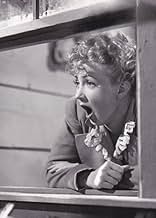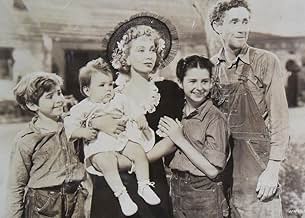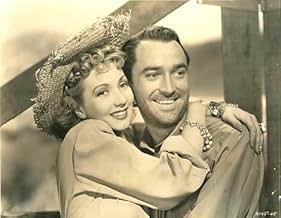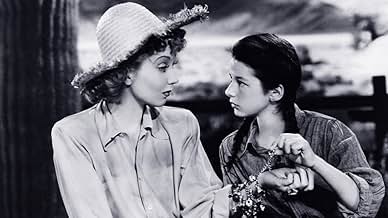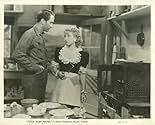Füge eine Handlung in deiner Sprache hinzuMaisie Ravier finds herself stranded in an Arizona ghost town with a family of migrant dust bowl refugees. The ghost town, it turns out, may have a gold mine.Maisie Ravier finds herself stranded in an Arizona ghost town with a family of migrant dust bowl refugees. The ghost town, it turns out, may have a gold mine.Maisie Ravier finds herself stranded in an Arizona ghost town with a family of migrant dust bowl refugees. The ghost town, it turns out, may have a gold mine.
- Regie
- Drehbuch
- Hauptbesetzung
- Auszeichnungen
- 1 wins total
Victor Kilian Jr.
- Ned Sullivan
- (as Victor Killian Jr.)
Dorothy Appleby
- Hatcheck Girl
- (Nicht genannt)
Jessie Arnold
- Wife of Prospector Hearing About Free Land
- (Nicht genannt)
Empfohlene Bewertungen
Well, it wasn't Alaska but Arizona where Maisie Ravier winds up next in MGM's third film of 10 for the blonde adventuress. While Arizona does have a history of gold mining, I don't know if there ever was another rush around 1940 as this film portrays. But that's the setting for "Gold Rush Maisie."
Enroute for another job singing in the Hula Parlor Café in Truxton, Arizona, Maisie's car breaks down. That leads to a night with a very unhospitable Bill Anders and his sidekick, and then to an adventure with a horde of prospectors who come in search of quick riches. These are mostly families that travel the farm planting and harvesting cycles in the Western states.
Maisie helps the folks set up a tent camp and file their claims, and in the end Anders melts a little. Some good drama and good neighborliness in this film. Ann Sothern continues to please audiences, and Lee Bowman is the grouchy Anders who finally softens up. The rest of the cast all are very good.
There's more drama than comedy in this film. Here are the better funny lines.
Maisie Ravier, "When I first saw you, I thought you were a stinker. Now I've changed my mind. You're not that good."
Maisie Ravier, "I'm not really ignorant - just uneducated."
Maisie Ravier, "As I look back on it, you've been awfully, awfully kind, in a sort of nasty way."
Enroute for another job singing in the Hula Parlor Café in Truxton, Arizona, Maisie's car breaks down. That leads to a night with a very unhospitable Bill Anders and his sidekick, and then to an adventure with a horde of prospectors who come in search of quick riches. These are mostly families that travel the farm planting and harvesting cycles in the Western states.
Maisie helps the folks set up a tent camp and file their claims, and in the end Anders melts a little. Some good drama and good neighborliness in this film. Ann Sothern continues to please audiences, and Lee Bowman is the grouchy Anders who finally softens up. The rest of the cast all are very good.
There's more drama than comedy in this film. Here are the better funny lines.
Maisie Ravier, "When I first saw you, I thought you were a stinker. Now I've changed my mind. You're not that good."
Maisie Ravier, "I'm not really ignorant - just uneducated."
Maisie Ravier, "As I look back on it, you've been awfully, awfully kind, in a sort of nasty way."
The movie may not have done much for comedic Maisie, but it' a worthy reflection of Depression era straits. I like the way Maisie's slowly drawn into the Davis family plight. They're a hard-scrabble family who've lost their farm, along with thousands of others, and are now living hand to mouth. The city-bred Maisie meets up with them as they along with other dispossessed farmers are traveling as part of a rumored gold rush. Though separated at first by a cultural contrast, Maisie's drawn into the family by the common humanity their plight represents, especially by winning little Jubie Davis (Weidler). Together, they share their meager money, along with hopes of a gold strike that will lift their fortunes.
Though MGM has hired a big crowd of extras and costumed them in appropriately seedy clothes, Maisie still stands out. But what about those tacky exteriors that fairly shout studio sound stage. Why make the costuming so realistic, then background them with such outdoor phoniness. After all, this is MGM. At times, Sothern's a little shrill for my taste, but manages to remain likable, while actor Bowman as the reluctant benefactor makes for a churlish and unusual leading man. Too bad little Weidler is largely forgotten. She made for a charmingly plain-faced youngster, without being cutesy. Anyway, the overall result is a curious combination of Depression era drama and Maisie type spunk minus the series' usual laughs. So, fans of the series may find this entry too pointed for their liking. But I enjoyed it for its strong moral and as a reflection of the desperate times.
(In passing-- My dad owned a Colorado gold mine many years ago, and I remember as a boy how eagerly he awaited assay office results so he would know where next to tunnel. In fact, with a few notable exceptions gold in its natural state is unrecognizable. Instead, it's blended into ore that must then be tested for its gold content. So the movie's element of suspense is not fictional.)
Though MGM has hired a big crowd of extras and costumed them in appropriately seedy clothes, Maisie still stands out. But what about those tacky exteriors that fairly shout studio sound stage. Why make the costuming so realistic, then background them with such outdoor phoniness. After all, this is MGM. At times, Sothern's a little shrill for my taste, but manages to remain likable, while actor Bowman as the reluctant benefactor makes for a churlish and unusual leading man. Too bad little Weidler is largely forgotten. She made for a charmingly plain-faced youngster, without being cutesy. Anyway, the overall result is a curious combination of Depression era drama and Maisie type spunk minus the series' usual laughs. So, fans of the series may find this entry too pointed for their liking. But I enjoyed it for its strong moral and as a reflection of the desperate times.
(In passing-- My dad owned a Colorado gold mine many years ago, and I remember as a boy how eagerly he awaited assay office results so he would know where next to tunnel. In fact, with a few notable exceptions gold in its natural state is unrecognizable. Instead, it's blended into ore that must then be tested for its gold content. So the movie's element of suspense is not fictional.)
These Maisie B-programmers were all based on a tough-as-nails (yet tea-totaling) 30-ish Brooklyn dame who finds herself in some oddball situation where she's broke &/or stranded and manages to get herself out of the jam and help &/or enlighten nearly everyone she comes into contact with (usually landing a $25/week job in the process). Here she's finds herself STRANDED in the middle of Arizona in a broken down Model A (the thing's just 9 years old and had the snot beat out of it) 100-miles late for a singing job in some dive. She meets an anti-social Lee Bowman and his inexplicable sidekick Slim Summerville (imagine Tom Poston's role on Newhart without the humor) and encounters a family of displaced Arkansas sharecroppers traveling to a gold strike (imagine Grapes of Wrath) after her job falls through. The gold strike is back near Bowman's property. This is one of the most meandering and dull Maisies ever made (remember the production was plagued by a change in directors). Absolutely no drama--- the only mildly curious aspect is why Bowman is the way he is (did he discover gold and is hidin' it?). Whatever buildup there is in the plot is deflated at the end, except for the 'Gold is where you find it' theme. It's also got the tragic Scotty Beckett in the role of the sharecropper's kid. Ann's still quite cute and makes with the snappy comebacks, but this entry amounts to nothing much more worthy than a rainy day time waster. Yawn...
Back in the old big studio days MGM didn't send their expensive cast and crews out on location if they could possibly keep them back home on the Culver City lot, especially if the story was set in the Arizona desert as this one is. This 1940 studio-bound production is a curiosity: full of phony sound-stage sets pretending to be exteriors, obvious painted backdrops and fuzzy process shots. Ann Southern and Virginia Weilder even have a big sister-little sister talk while walking on a treadmill as a process-shot desert background is projected in the background. No production shot today could get away with all this fakery. On the plus side, the good-hearted screenplay co-written by Mary C. McCall, Jr, president of the Screen Writer's Guild, is one of the few scripts, other than "The Grapes of Wrath," to have dealt sympathetically with the plight of Dust-bowl farm families who moved west in search of a better life.
Gold Rush Maisie finds Ann Sothern as the good hearted show girl from Brooklyn going out west with a family that looks remarkably like Joads of Oklahoma. All that was missing was Henry Fonda.
In fact the subject matter was just like The Grapes Of Wrath. Uprooted farmers moving about the country looking for odd jobs in crop picking. Only here rumors of a gold strike are sending a bunch of them west to the Arizona desert. After a bit of kindness on Maisie's part, she hooks up with the Davis family which consists of parents John F. Hamilton, Mary Nash and kid Virginia Weidler, Scotty Beckett and an infant.
All the same problems that John Ford so graphically illustrated and John Steinbeck so graphically wrote about are present in Gold Rush Maisie. Pity that no one with a head as level as Maisie's was around in The Grapes Of Wrath. Many social problems would be solved.
Who'd have thought a film of social significance would have come from the Maisie series, but it did.
In fact the subject matter was just like The Grapes Of Wrath. Uprooted farmers moving about the country looking for odd jobs in crop picking. Only here rumors of a gold strike are sending a bunch of them west to the Arizona desert. After a bit of kindness on Maisie's part, she hooks up with the Davis family which consists of parents John F. Hamilton, Mary Nash and kid Virginia Weidler, Scotty Beckett and an infant.
All the same problems that John Ford so graphically illustrated and John Steinbeck so graphically wrote about are present in Gold Rush Maisie. Pity that no one with a head as level as Maisie's was around in The Grapes Of Wrath. Many social problems would be solved.
Who'd have thought a film of social significance would have come from the Maisie series, but it did.
Wusstest du schon
- WissenswertesThe third of ten movies starring Ann Sothern as the heroine Maisie Ravier released by MGM from 1939 to 1947.
- PatzerEarly in the movie when Maisie is frightened and gives out a yell; she gets a loud echo. The only mountains in the area are far off in the distance. There is nothing in the area that would cause an echo.
- Zitate
Maisie Ravier: Every man knows somethin' about a car.
- VerbindungenFeatured in 100 Years of Comedy (1997)
Top-Auswahl
Melde dich zum Bewerten an und greife auf die Watchlist für personalisierte Empfehlungen zu.
Details
- Erscheinungsdatum
- Herkunftsland
- Sprache
- Auch bekannt als
- Çamsakızı Altın Arıyor
- Drehorte
- Produktionsfirma
- Weitere beteiligte Unternehmen bei IMDbPro anzeigen
- Laufzeit
- 1 Std. 22 Min.(82 min)
- Farbe
- Seitenverhältnis
- 1.37 : 1
Zu dieser Seite beitragen
Bearbeitung vorschlagen oder fehlenden Inhalt hinzufügen

